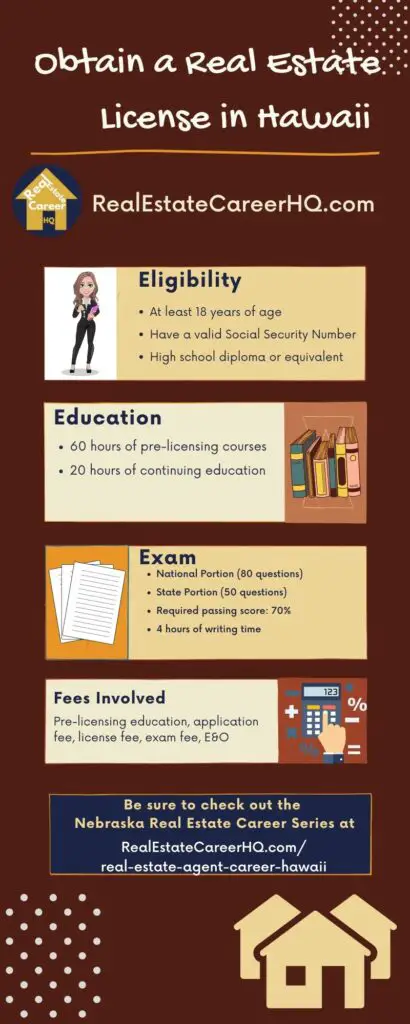(**) Disclosure: This post may contain affiliate links, meaning RealEstateCareerHQ.com will get a commission if you decide to make a purchase through the links, but at no additional cost to you.
To become a real estate agent in Hawaii, an applicant must be at least 18 years old, complete 60 hours of pre-licensing education, pass the salesperson exam, go through a criminal background check, submit an application and fees to the Hawaii Real Estate Commission.
Before you decide to pursue further in this profession, it’s important to know what the role of a real estate salesperson is. To put it simply, an agent acts as an intermediary between buyer and seller in order to facilitate the sale or purchase of property. They help clients find homes that meet their needs and negotiate contracts with sellers for those homes. Some agents also help clients in searching for a rental property or lease out their units.
In this guide, you’ll learn about the step-by-step process to become a real estate salesperson in Hawaii and FAQ on getting the license.
But before we start, I want to give a brief disclaimer. This post is not intended as legal advice or state/federal real estate training. It is for general information only. Please always follow your State laws and best practices.
Infographic on Obtaining a Real Estate License in Hawaii

8 Steps to Become a Real Estate Agent in Hawaii
Step 1: Meet the eligibility requirement
- U.S citizen
- At least 18 years old
- Have a high school diploma or equivalent
- Have a social security number
Step 2: Complete the pre-licensing education

The pre-license consists of 60-hour with 18 sections. Here is the curriculum:
| Section | Topics | Course Hours |
|---|---|---|
| 1 | INTRODUCTION AND HAWAIIAN HISTORY | 2 |
| 2 | LAWS, LAND USE AND CONTROLS | 3 |
| 3 | HAWAII LICENSING LAWS | 5 |
| 4 | AGENCY | 3 |
| 5 | PROPERTY RIGHTS | 4 |
| 6 | TRANSFERRING REAL PROPERTY INTEREST | 4 |
| 7 | ENCUMBRANCES | 3 |
| 8 | CONTRACTS | 4 |
| 9 | CLOSING/SETTLEMENT | 3 |
| 10 | DISCLOSURES | 4 |
| 11 | VALUATION AND MARKET ANALYSIS | 3 |
| 12 | FINANCING | 4 |
| 13 | PROPERTY MANAGEMENT AND LEASING | 3 |
| 14 | FORMS OF OWNERSHIP | 5 |
| 15 | DISCRIMINATION | 3 |
| 16 | TAXES | 2 |
| 17 | HAWAII FORMS | 2 |
| 18 | MATHEMATICS | 3 |
| Total | 60 Hours |
I just checked with an education provider and the course fee is around $250 to $454. Usually, the higher-priced package would come with exam prep which aims to help you pass the exam on the first try. It also better equips you with the knowledge necessary for your real estate practice.
When choosing a real estate school, I prefer one where you could take the courses online. This way, you could study at your own pace whenever and wherever. The CE Shop is a trustworthy real estate education provider. You may click here to see whether they offer pre-licensing course in your state. (**)
Step 3: Pass the Hawaii Real Estate Salesperson Exam

The Course Completion Certificates are only valid for 2 years from the date of issuance. And you must pass the Hawaii Real Estate Salesperson Exam before it expires.
The Hawaii Real Estate Salesperson Exam consists of the National Portion (80 questions) and the State Portion (50 questions) with 4 hours of writing time. The required passing score is 70%. It is administered by PSI and the exam fee is $61.
Here’s a guide covering a lot more in-depth about the real estate exam. Be sure to check it out.
Step 4: Submit an application to Hawaii Real Estate Commission
After you pass the exam, you will receive the salesperson application at the test center. You must complete and submit it to the HREC within two years.
There is a registration fee of $382 for odd numbered year and $282 for even numbered year.
Once you have all the required documents and fee, you may mail them to: Real Estate Commission: DCCA/PVL, Licensing Branch, P. O. Box 3469, Honolulu, HI 96801
Alternatively, you may hand deliver to: Licensing Branch: 335 Merchant Street, Room 301, Honolulu, HI 96813
Step 5: Join a real estate brokerage

To activate your salesperson license In Hawaii, you must be affiliate with a real estate broker. This is the firm who would sponsor your real estate license.
Finding a good trainer is crucial at the initial stage of your real estate career. It’s important to learn a repeatable and systematic process in running your business profitably. When choosing a real estate brokerage, many people only focus on the commission split, but there are many other factors you also need to consider.
For example, what type of training will they provide? Will they equip you with the skills in finding qualify prospects and closing a sale? Is there a shared office space you could use? Can the brokerage provide you with adequate administrative and marketing support? Will they provide you with leads to work on? Do they utilize up-to-date technology (i.e.: CRM, software subscription) to streamline the daily workflow.
Here’s a page with a job search engine. You may check whether there is any opening position in your area.
Step 6: Go through a criminal background check
Since Hawaii Real Estate Commission has the responsibility to protect the public interest, all real estate licensees must go through a criminal background check. Whether a felon can obtain a Hawaii real estate license is subjected to case-by-case evaluation.
Step 7: Obtain a Errors & Omissions Insurance
The E&O policy is to protect your clients should they submit a claim against your wrongdoing. This is mandatory for all real estate licensees in Hawaii.
You must obtain the coverage from a qualified insurance carrier.
Step 8: Maintain the real estate license

All Hawaii real estate licensee must renew their license every two year.
Within 180 days after the Commission issue your license, you need to complete 12 hours of post-license education. This typically covers the required knowledge and skills for real estate practice such as completing contracts, listing agreements and handling of client funds.
Furthermore, active licensees must take 20 hours of education during each license renewal cycle, of which includes:
- 6 hours for the commission designated core course
- 14 hours of elective credit hours.
The Commission may conduct random audits to verify the CE credit. Therefore, it’s better to maintain the CE records and proof of completion documents.
There is a renewal fee of $268.
So know your deadlines and don’t wait until the last minute to complete CE and renew your license. Failure to renew on time not only result in late renewal fee, but it can cause interruption to your business.
If you are reading up to this point, I bet you must be interested in getting a real estate license. Your first step is to complete the pre-licensing courses. You should select one that has an excellent reputation and long-term track record of satisfying students. The Colibri is exactly that! You may click here to check it out yourself. (**)
FAQ about Real Estate License in Hawaii

How much does it cost to get a real estate license in Hawaii?
It costs approximately $897 to get a real estate license in Hawaii. Here’s the breakdown:
- Pre-licensing courses – $250 to $454 (approximately)
- Exam fee $61
- Registration fee $382
The above are just the costs of getting the salesperson license. In addition, to start a real estate business, there will be other expenses involved such as E&O, MLS subscription, phone, internet, and office supplies, CE, and renewal fees.
Also, you may want to invest into exam prep. This can increase your chance in passing the exam on the first try, so that you don’t need to waste time and money in retaking it.
How long does it take to become a real estate agent in Hawaii?
It takes approximately 3 to 4 months to become a real estate agent in Hawaii. But it also depends on the time it takes you to complete the pre-licensing course, exam, application, and get sponsorship by a licensed real estate brokerage.
Can you apply the real estate license through reciprocity?
Hawaii are not reciprocal with any other state. But if you are a licensed salesperson in another state, you may qualify for an equivalency to the pre-license education requirement and/or the equivalency to the Uniform Examination.
However, you do not have to be a Hawaii resident to obtain a real estate license. Though, you still need to be employed and supervised in the manner which complies with Hawaii real estate law.
Can a felon be a real estate salesperson in Hawaii?
The Hawaii Real Estate Commission will consider the applicant’s honesty, trustworthiness, character and integrity. But whether a felon can obtain a Hawaii real estate license is subjected to case-by-case evaluation.
If you have any doubt, you may request for a preliminary decision before going through the pre-licensing course and exam. Here’s the request application.
Those with potentially disqualifying factors can apply to the Commission for a preliminary, non-binding decision and receive an indication of whether the Commission would approve an application before undertaking the expense of completing a prelicense course and taking the license examination. You may review and download the instructions and application to request for preliminary decision.
In there, it asks you questions regarding conviction, disciplinary actions, license suspended/fined/revoked.
If you answer “yes”, then you will need to provide the Commission with detailed information and supporting documents.
But don’t get discouraged as everyone has a past. The most important is that you can demonstrate that you will serve the public in a fair, honest, and open manner.
Here’s another post that covers how to apply for a real estate license with a felony record. In there, you’ll find practical ideas which could help your application.
How to become a commercial real estate agent in Hawaii?

To become a commercial real estate agent in Hawaii, an applicant must be at least 18 years old, complete 60 hours of pre-licensing education, pass the salesperson exam, submit an application, go through criminal background check, submit application and fees to the Hawaii Real Estate Commission.
Basically, it is the same requirement as we just went through because most states do not issue separate licenses for residential and commercial agents.
Furthermore, if you are going to pursue a career as a CRE agent, you should look for a brokerage that could give you the right support and resources.
Here’s the “Complete Guide to a Commercial Real Estate Agent Career“, where I cover the career outlook, earning potential, and valuable feedback from CRE agents. Be sure to check it out.
I have more questions about the Hawaii real estate license, whom should I contact?
You may contact the Hawaii Real Estate Branch at hirec@dcca.hawaii.gov for more details about the real estate license.
This article is part of the “Hawaii Real Estate Career Series.” If you want to know more about being a real estate agent in Hawaii, I invite you to check out the following articles:
- How to Pass the Hawaii Real Estate Exam?
- How Much do Real Estate Agents Make in Hawaii?
- Practical Career Tips for Real Estate Agents in Hawaii
Looking to succeed in the real estate industry? Subscribe to our exclusive email list today and gain access to expertly curated real estate guides from industry leaders, as well as discounted CE courses and the latest industry updates. From marketing strategies to virtual staging techniques, our handpicked resources cover everything you need to know to stay ahead of the game. Click here for more details!
(**) Affiliate Disclosure: Please note that some of the links above are affiliate links, and at no additional cost to you. Our company, JCHQ Publishing will earn a commission if you decide to make a purchase after clicking on the link. Please understand that we include them based on our experience or the research on these companies or products, and we recommend them because they are helpful and useful, not because of the small commissions we make if you decide to buy something through the links. Please do not spend any money on these products unless you feel you need them or that they will help you achieve your goals.
Disclaimer: The information in this post is for general information only, and not intend to provide any advice. They are subjected to change without any notice, and not guaranteed to be error-free. Some of the posts on this site may contain views and opinions from individual not related to JCHQ Publishing. They do not necessarily reflect our view or position.
Reference:

